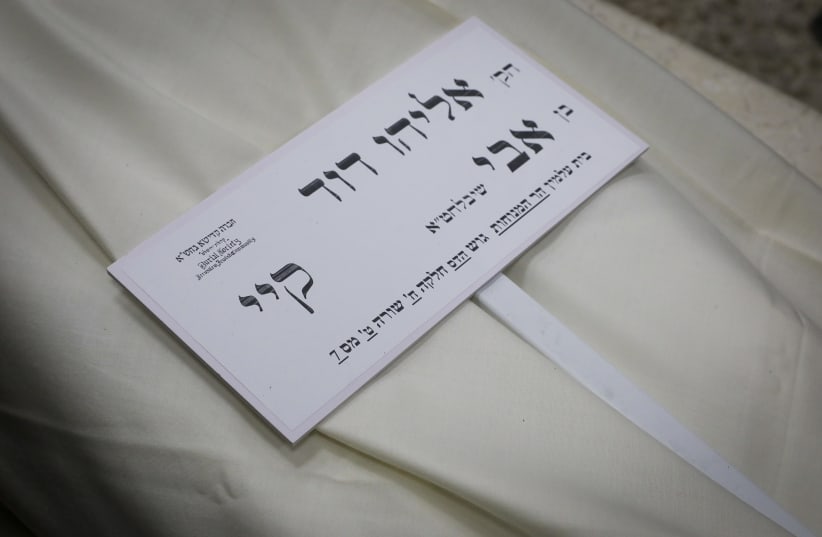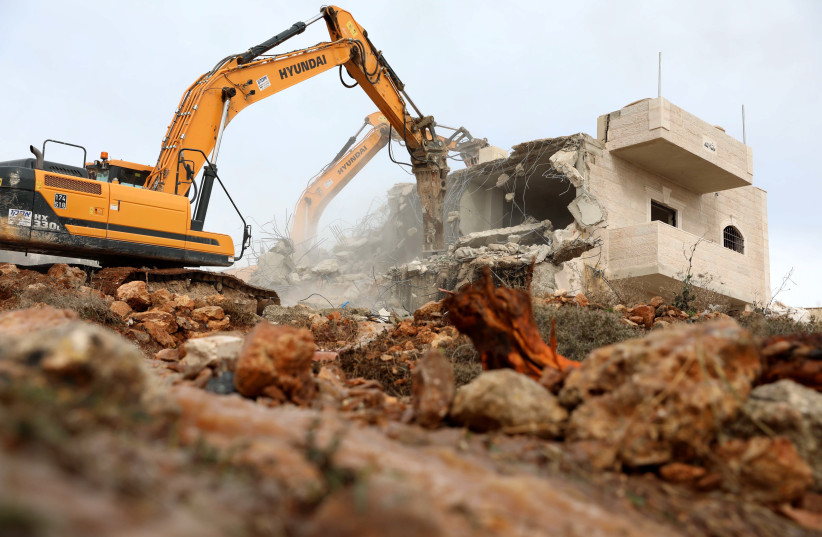Last week, the IDF issued a demolition order for the Shuafat home of Hamas activist Fadi Abu Shkhaydam, who, in November, shot and murdered Eliyahu Kay and injured four others in Jerusalem’s Old City.
Washington won’t be applauding; the Biden administration disagrees with Israel’s policy of house demolitions. State Department Spokesperson Ned Price declared in July that “the home of an entire family shouldn’t be demolished for the action of one individual.” Price’s comments came after Israel demolished the house Muntasir Shalabi, who murdered Yehuda Guetta, and injured two others, in a West Bank drive-by shooting.
The American criticism is shared by some prominent Israelis, including former Supreme Court justice Menachem Mazuz, who for legal, ethical or utilitarian reasons opposes such demolitions.
The essence of the critique is clear: The practice of house demolitions, inherited by Israel’s legal code from the British Mandate, seemingly involves a state-sponsored punitive act against those not accused of any wrongdoing, their sole “crime” being that they share a common dwelling with a terrorist. The Israeli government counters that the requirements of effective counterterrorism necessitate the selective use of procedures that may fall outside conventional judicial practice.
In a routine criminal situation, when the perpetrator of a crime is apprehended, the authorities hold the wrongdoer accountable, and punishment will ensue in accordance with the law.
But in terrorism cases, convicting the perpetrator to a hefty jail term after having already carried out an attack, while being just, involves the abject failure of counterterrorism. No society can prioritize the punishment of terrorists over the prevention of terrorism. The policy preference must always be protecting the public by preventing the terror attack from occurring in the first place.
This can be achieved by deterring the potential terrorist from carrying out an attack. Yet a lengthy prison term is unlikely to be a practical deterrent for many terrorists. Even the threat of capital punishment (on the statutes in Israel but never used in a terror case and implemented only once, in the 1962 execution of Nazi war criminal Adolf Eichmann) is of doubtful efficacy for those who see in martyrdom a path to the rewards of the afterlife.
In facing this challenge, the Israeli government believes that the threat of house demolition can help fill the deterrence vacuum. If the terrorist has no qualms whatsoever about murdering innocent civilians and killing themselves in the process, they will at least be forced to consider the possible ramifications of their actions upon their family.
The Palestinian Authority also wants a potential terrorist to think about their family, but with the opposite intention.
Under the PA’s policy of “pay for slay” a Palestinian family accrues tangible benefits stemming directly from the involvement of a family member in terrorism. Not only are official public honors bestowed, but the family receives special cash support from the Palestinian treasury. These financial allocations increase with the gravity of the terrorist crime: the longer the jail sentence, the higher the payments and, therefore, the deadlier the terror attack the greater the economic remuneration.
For those on the lower rungs of the socioeconomic ladder, these monetary incentives can be especially significant – the stipend paid higher than the average Palestinian wage.
There has been much international criticism of “pay for slay.” In 2018, the US Congress passed the Taylor Force Act, named after the Vanderbilt University student murdered by a Palestinian terrorist. The act seeks to limit American aid to the PA for as long as financial support for terrorists and their families continues. The Knesset has similarly adopted legislation that automatically deducts from the taxes collected and transferred to the PA the equivalent of payments made rewarding terrorism.
In this respect, Israel’s policy of demolishing the homes of terrorists serves to even out the playing field. The Palestinian leadership chooses to encourage acts of terror by providing financial and other incentives to terrorists’ families; Israel chooses to discourage and de-incentivize terror through the threat of a house demolition.
Of course, no house can be destroyed without giving its inhabitants adequate opportunity to seek a reprieve from the High Court of Justice. Internationally respected for its professionalism and independence, the court assesses each demolition on a case-by-case basis, this week dealing with the home of Fadi Abu Shkhaydam.
While having accepted that demolitions are a legitimate tool in the fight against terrorism, the Court in repeated rulings has insisted on proportionality and minimizing any collateral damage.
Israel’s security services have also not been on autopilot, the utility of demolitions subject to numerous reviews and the practice even suspended over a period. Yet the Shin Bet (Israel Security Agency), the key agency dealing with Palestinian terrorism, attests to it being a proven deterrent to potential terrorists as well as having encouraged numerous family members to pro-actively take steps that prevented attacks.
The experience of the last few weeks demonstrates that the terrorist threat against the Israeli civilian population remains very real, and it would be folly to remove from the counterterrorism toolbox a means that, according to security professionals, saves lives.
Obviously, some in the international community are uninterested in the nuts and bolts of counterterrorism, claiming instead that Israel should focus on the root causes of violence and expedite a political solution that gives Palestinians their national freedom.
However noble such an intent, it contains limited practical utility. Terrorists like Fadi Abu Shkhaydam are not interested in any solution, other than one that excludes the existence of a Jewish state. They openly proclaim that civilians are legitimate targets, that negotiations with Israel are “a waste of time, an exercise in futility” and that there is “no solution for the Palestinian problem but jihad.”
The unvarnished reality is that for as long as this sort of extremism remains an integral part of Palestinian reality, Israel will require an effective counterterrorism strategy, and without an adequate deterrence-enhancing alternative, that will also have to include the judicious use of house demolitions.
During my time at Israel’s Washington Embassy, there was a period when George W. Bush’s administration expressed its opposition to Israeli “extrajudicial killings” targeting terrorist commanders. That criticism ceased after 9/11 when the United States adopted the same strategy, utilizing it conspicuously in the attacks the eliminated Osama bin Laden and Qasem Soleimani.
I hope there will never be circumstances when the terror threat against Americans will be such that it necessitates a State Department spokesperson justifying their own country’s policy of house demolitions.
The writer, formerly an adviser to the prime minister, is a senior visiting fellow at the INSS. Follow him at @MarkRegev on Twitter.

